Overview
The Baltimore/Washington International Thurgood Marshall Airport (BWI Marshall Airport) is owned and operated by the Maryland Aviation Administration (MAA). As part of our continuing efforts to mitigate the effects of aircraft noise within areas surrounding BWI Marshall Airport, The MAA is pleased to announce the continuation of the voluntary Residential Sound Insulation Program (RSIP). The MAA has hired The Jones Payne Group, a nationally recognized expert in aviation noise mitigation to manage and implement the BWI Marshall Airport RSIP. The objective of the sound insulation program is to reduce the interior noise levels within eligible residential dwelling units to be compatible with airport operations. The Federal Aviation Administration (FAA) goals for the project are to achieve an interior noise level no greater than a Day Night Average Sound Level (DNL) 45 dB and a minimum 5 dB reduction by installing new acoustically rated windows, doors, ventilation, and other customized treatments approved by the FAA.
Eligibility for the Residential Sound Insulation Program is determined first by evaluating the location of a home relative to noise contours on BWI’s most recent FAA-approved Noise Exposure Map (NEM). An exterior Day Night Average Sound Level greater than DNL 65 dB is what the FAA considers as the threshold for residential land use incompatibility around airports. Residential properties that fall entirely within the DNL 65 dB noise contour are potentially eligible for participation in the RSIP. To view the Noise Exposure Map, please click here.
Final determination of eligibility will made through acoustical testing on the property to ensure the home has an interior noise level equal or greater than DNL 45 dB.
In addition to being located within the FAA-approved noise exposure boundaries and having an interior noise level DNL 45 dB or greater, a home must also meet all the following criteria:
- Zoned as residential property
- Built prior to October 1, 1998
- Free of major building code violations
For questions regarding eligibility, please call (410) 859-7793 or email maa-rsip@bwiairport.com.
The Sound Insulation Process

The RSIP is a multi-phase program and the MAA is prioritizing treatment of eligible homes with the greatest noise exposure. Due to the number of potentially eligible properties, homes will be assembled into groups of multiple properties. The size of these groups, also called phases, will be dependent upon anticipated available funding.
Homeowners will be notified in writing when their home has been selected for inclusion in a phase. The letter will include an invitation to attend the phase’s initial homeowner meeting that serves as an informational session to explain the sound insulation process, distribute pertinent documents, and address homeowner questions and concerns.
Please note: You will NOT be contacted by any person or business other than representatives of the MAA or The Jones Payne Group.
Because this program is voluntary, if you have been selected for inclusion in a phase you will need to let us know whether you wish to participate in the full eligibility determination of your home. You must return the following completed documents to us before you start the eligibility process:
- Application: The Residential Sound Insulation Program (RSIP) is voluntary. The application is where you indicate whether you wish to participate in the RSIP. In addition to requesting information specific to the property, it gives the RSIP team permission to perform the required acoustical tests and measurements to determine eligibility and to identify what modifications are necessary to achieve the required sound reduction goals. This document must be signed by all owners of the home listed on the title of the home. Completion of the Application does not bind you to receive the sound insulation modifications, but you will be required to complete this document before we schedule any appointments with you.
- Title Search/Lienholder Form: The FAA requires that we perform a title search of your home to verify that you are currently listed as the owner according to county records. We will also conduct a lien holder search to determine any mortgages.
- Pre-Construction Survey: This survey allows us to determine your specific noise concerns in your home. This data will be compared to a Post-Construction Survey that will be completed after completion of construction.
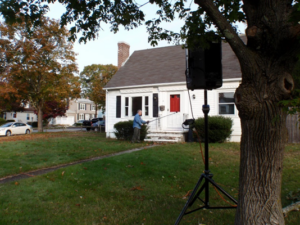 After completion and submission of the above-listed documents, the homes will be scheduled for an acoustical test to determine the interior noise level of the home. The acoustical test will determine whether the home meets FAA requirements regarding interior noise levels and assist in determining the treatments that will be required.
The acoustical engineer will measure existing noise levels by artificially producing noise using a loudspeaker. It will be necessary for the home to be quiet during the measurements (no TV, radio, etc.) and all windows and doors closed and locked. We ask that homeowners prepare for the acoustical test by closing and locking all windows and doors, opening all curtains and blinds, and removing any through-window air conditioning units. You will be notified in writing of your home’s test results approximately 3-4 weeks after testing is complete.
After completion and submission of the above-listed documents, the homes will be scheduled for an acoustical test to determine the interior noise level of the home. The acoustical test will determine whether the home meets FAA requirements regarding interior noise levels and assist in determining the treatments that will be required.
The acoustical engineer will measure existing noise levels by artificially producing noise using a loudspeaker. It will be necessary for the home to be quiet during the measurements (no TV, radio, etc.) and all windows and doors closed and locked. We ask that homeowners prepare for the acoustical test by closing and locking all windows and doors, opening all curtains and blinds, and removing any through-window air conditioning units. You will be notified in writing of your home’s test results approximately 3-4 weeks after testing is complete.
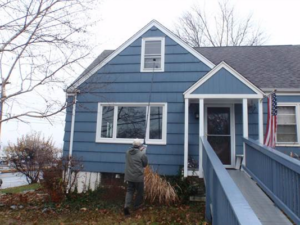 This appointment lasts approximately 2 hours.
This appointment lasts approximately 2 hours.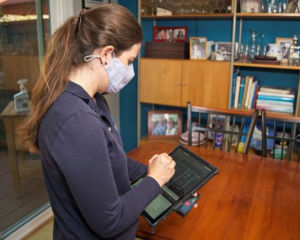 Once we receive your completed forms and we have verified the home meets the eligibility requirements, we will need to schedule a series of appointments with you to begin the design process.
Once we receive your completed forms and we have verified the home meets the eligibility requirements, we will need to schedule a series of appointments with you to begin the design process.
Design Assessment Visit: The RSIP Homeowner Coordinator will contact you to schedule a design assessment visit. At this meeting, architectural measurements will be taken to create a blueprint of the home. The home will be inspected for any unique features that may need to be addressed for sound insulation purposes and will be photographed to record the existing condition of the home. If applicable, the mechanical and electrical requirements will be determined at this time. During this meeting, you will be presented with your preliminary options for any windows and doors slated to be replaced so we ask that the person or person(s) most comfortable with these decisions is present for this meeting.
This appointment lasts approximately 2 hours.
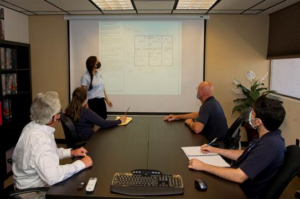 Design Review Meeting: Once the architectural, mechanical, electrical, and acoustic requirements are established, the RSIP team will design a set of treatments for your home. The RSIP Homeowner Coordinator and design team will meet with homeowners to review the proposed scope of work. You and all other persons listed on the deed must attend at this meeting. The team will discuss all proposed treatments with you and answer your questions. Per FAA and RSIP policy, changes will not be approved that would result in your home not meeting the required noise reduction goals.
Design Review Meeting: Once the architectural, mechanical, electrical, and acoustic requirements are established, the RSIP team will design a set of treatments for your home. The RSIP Homeowner Coordinator and design team will meet with homeowners to review the proposed scope of work. You and all other persons listed on the deed must attend at this meeting. The team will discuss all proposed treatments with you and answer your questions. Per FAA and RSIP policy, changes will not be approved that would result in your home not meeting the required noise reduction goals.
This meeting lasts approximately 1 hour.
Legal Agreements Signing: If you accept the proposed scope of work and wish to proceed with the installation of the sound insulation treatments, all persons listed on the deed of the property must sign the Homeowner Participation Agreement and the Avigation Easement which will legally bind your participation in the Program. These documents will not be required to be signed until after the completion of the design process and the homeowners’ review of the proposed scope of work on their home. The RSIP Homeowner Coordinator and a Notary Public will meet with homeowners to conduct the signing and execution of the following legal agreements.
Homeowner Participation Agreement (HPA): This will become the contract between the Homeowner(s) and the MAA. As this is a legal binding contract, once this document is signed, you cannot make changes to the agreed-upon treatment package, i.e., finish items, colors, window/door styles, etc. The Agreement obligates you to do a number of things, including:
- Providing the MAA, its consultants, and the contractor access to your home during the construction period (additional access will be necessary for post-construction acoustical tests and inspections);
- Not performing any structural, mechanical or architectural changes to your home from the time of agreement signing to the end of construction;
- Not hiring the RSIP contractor to perform additional work in your home during the construction period;
- Having an authorized representative (18+) at home during construction;
- Moving furnishings and window dressings to allow for the work.
Avigation Easement: The easement is an MAA requirement and must be signed along with the Homeowner Participation Agreement before the modifications to your home can be assembled into a bid package. The Avigation Easement will grant the use of airspace; the right of free, unrestricted, and unobstructed overflight, and the effects that may result from the over-flight of aircraft and aircraft taking off and/or landing at BWI Marshall Airport. The easement must be signed by all persons listed on the deed of the property and will be recorded in the Land Records of Anne Arundel County upon completion of the sound insulation treatments.
Subordination and/or Ground Rent Agreement: The subordination process assures the Avigation Easement will remain on the title of the property in the event of foreclosure. The Program will obtain a subordination agreement of any lien holders who hold a lien on the property to subordinate their interests to the Avigation Easement. Properties that do not have a mortgage, ground rent or lien holder will not be required to execute a subordination agreement. Ground rent subordination agreements will be required when applicable.
This meeting lasts approximately 30 minutes.
After the legal documents are signed, the design plans for each group (or phase) of homes will be combined into a comprehensive bid package. The MAA will follow applicable federal and state public procurement guidelines to advertise and competitively award a construction contract to the most responsive and responsible bidder. There will be one general contractor selected for each phase of homes.
The bid process takes approximately 4-6 months.
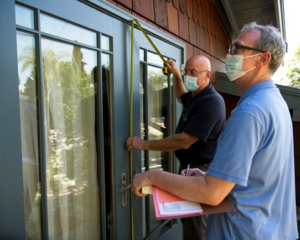 Pre-Construction Measurements: Once the bid package has been awarded to a contractor, the contractor needs to return to your home to take final measurements for specified materials such as windows and doors. You will be contacted by the Homeowner Coordinator to schedule this meeting. Representatives of the RSIP team and manufacturers will be present during this walk-through meeting. Other issues that will be addressed at this meeting are finishing details, such as door colors and wood trim finishes. We ask that the homeowner most comfortable making these decisions is present. To allow enough time for all the materials to be ordered, this meeting will occur well before actual construction.
Pre-Construction Measurements: Once the bid package has been awarded to a contractor, the contractor needs to return to your home to take final measurements for specified materials such as windows and doors. You will be contacted by the Homeowner Coordinator to schedule this meeting. Representatives of the RSIP team and manufacturers will be present during this walk-through meeting. Other issues that will be addressed at this meeting are finishing details, such as door colors and wood trim finishes. We ask that the homeowner most comfortable making these decisions is present. To allow enough time for all the materials to be ordered, this meeting will occur well before actual construction.
This visit lasts approximately 1 hour.
Pre-Construction Walk-Through: The contractor and RSIP team members will visit your home 48 hours before the start of construction. The contractor will review with you the scope of work for your home, take pre- construction photographs and ensure the property has been prepared for construction.
This visit lasts approximately 30-60 minutes.
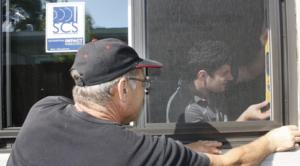 The contractor will need ten (10) consecutive working days (not including weekends and holidays) to complete major construction on your home. A homeowner or authorized representative 18 years or older must be present during this time. The contractor will need to return to the home after this time to address minor work items. These items, called “Punch List” items, are not fully scheduled into the construction contract, so expect to see the contractor a few times after the scheduled construction period has ended. Throughout the construction process, the RSIP team will be inspecting the workmanship to ensure that all work conforms to the specifications. Any deficiencies will be corrected by the contractor prior to final acceptance by the Program Team. Inspections will also be conducted by the Anne Arundel building department.
The contractor will need ten (10) consecutive working days (not including weekends and holidays) to complete major construction on your home. A homeowner or authorized representative 18 years or older must be present during this time. The contractor will need to return to the home after this time to address minor work items. These items, called “Punch List” items, are not fully scheduled into the construction contract, so expect to see the contractor a few times after the scheduled construction period has ended. Throughout the construction process, the RSIP team will be inspecting the workmanship to ensure that all work conforms to the specifications. Any deficiencies will be corrected by the contractor prior to final acceptance by the Program Team. Inspections will also be conducted by the Anne Arundel building department.
You should expect the total construction process to take approximately 30-40 days.
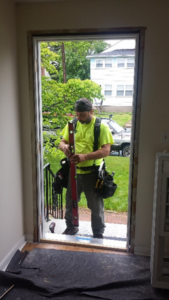 Post-Construction Acoustical Testing: After final acceptance of the modifications to your home, post construction acoustical tests may be conducted. Approximately 30% of homes will receive this test. These test results are used to ensure the Program has met the FAA’s required level of noise reduction.
Post-Construction Acoustical Testing: After final acceptance of the modifications to your home, post construction acoustical tests may be conducted. Approximately 30% of homes will receive this test. These test results are used to ensure the Program has met the FAA’s required level of noise reduction.
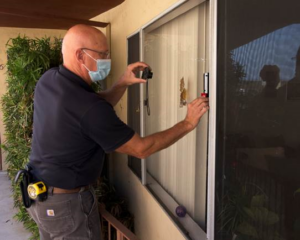 Post-Modification Survey: After the work has been completed, you will be asked to complete a satisfaction survey rating the work and materials received from the Residential Sound Insulation Program.
Post-Modification Survey: After the work has been completed, you will be asked to complete a satisfaction survey rating the work and materials received from the Residential Sound Insulation Program.
You will receive a warranty package once your home has passed the final inspection. The contractor is required to warranty their work for a period of one (1) year after final inspection. Individual products, such as windows, doors and HVAC equipment may carry a longer manufacturer’s warranty. During the 1-year warranty, we ask that homeowners contact the RSIP to address all warranty issues so that we may ensure a prompt response to your issue. After the 1-year contractor warranty, homeowners must contact the manufacturers directly for any issues.
Frequently Asked Questions
Acoustical treatments are determined by the Sound Insulation Program Team and the MAA’s Acoustical Consultant, which evaluates the needs of each home individually, on a house-by-house basis. These treatments will be reviewed with the MAA staff to ensure their consistency with FAA reimbursement guidelines. Proposed treatments will then be reviewed with each homeowner before the required Homeowner Participation Agreement and Avigation Easement are signed and executed.
Per the Homeowner Participation Agreement, homeowners may not undertake any repairs or remodeling while the home is in the construction phase of the Sound Insulation Program. Improvements that are not directly related to noise reduction are outside of the program’s scope are NOT covered by the program and may NOT occur from the time Sound Insulation Program construction begins in your home until it is officially completed.
Homeowners are required to be present for 10 working days (excluding weekends and holidays) once construction begins, most homes are substantially completed within this timeframe. Substantial completion is achieved when all products required under the contract are installed, but it does not include “punch list” time (construction review, inspection, and follow-up modifications). Any work required to be completed after the initial 10 working day period will be scheduled with the homeowner. From start to finish, it generally requires 30-40 days to finish all the work.
The FAA and the MAA pay for the basic costs for labor and materials to install sound insulation treatments. Typical costs to the homeowner would be to adjust or replace window dressings (blinds, draperies, etc.), storing of materials removed from the home, or preparing the home for installation of the treatments (if needed).
The work is bid out by the MAA to insured, licensed, and bonded general contractors. Contractors bid for the work, and the contractor with the lowest, most responsive bid is awarded the job.
Sorry, no. Improvements completed by the homeowner are not eligible for reimbursement.
No. The new windows are tighter-fitting, insulated windows that provide a weather-tight, energy-efficient seal. Sealing your home makes it more comfortable and quieter, but also keeps normal household moisture in. Any condensation (“fog”) on the windows is a sign of the windows’ effectiveness at restricting the escape of moisture and heat from your home.
Each home will be evaluated to determine the necessary treatments. An air conditioning system may be installed with the sound insulation package if your home does not already have one.
No. Your old windows and doors will become the property of the contractor.
No. The federal guidelines require the Program to replace what exists. This is an acoustical program and not a home-hardening or remodeling program.
Yes, you or a designated representative over the age of 18 will need to be present during the construction process. You can expect the contractor to be in your home the entire day for the first 10 days. After they have reached substantial completion, the contractor will schedule appointments with you to finish the punch-list items or schedule an Anne Arundel County Building Department permit inspection.
Glossary
Acoustical: Conditions or products related to hearing, noise or sound.
Avigation Easement: The Avigation Easement will grant the use of airspace; the right of free, unrestricted, and unobstructed overflight, and the effects that may result from the over-flight of aircraft, aircraft taking off and/or landing at BWI Marshall Airport. The easement will run in perpetuity with the property.
Bid Package: A group of houses assembled together into one construction contract.
Condensation: The result of high humidity (moisture in the air) that produces a “fog” when it hits a colder surface such as a glass window.
Day-Night Level (DNL): Average Annual Sound Levels that represent the sound levels over a 24-hour period, while taking into account quiet periods as well as aircraft over- flights. For flights that occur after 10PM and before 7AM, these events receive a 10 dB penalty. The DNL noise exposure contours in the affected residential neighborhoods are 75 DNL to 65 DNL.
Decibel (dB): A unit of measure for the vibration (low rumble or high whistle) and strength (soft or loud) of sound waves. The higher the decibel level (vibration and strength), the louder the sound. Most sounds we experience in our day-to-day lives vary between 30 dB (a typical bedroom at night) and 100 dB (inside a nightclub).
Eligibility: Qualified to participate in the Sound Insulation Program by having a home or property located in the designated treatment areas and with an existing interior noise level that meets the FAA guidelines.
Federal Aviation Administration (FAA): The branch of the federal government which provides funding and oversight of the Residential Sound Insulation Program.
Homeowner Participation Agreement: An agreement between a homeowner and the MAA that authorizes the installation of specific sound insulation treatments at a given residential property.
Maryland Aviation Administration (MAA): The branch of the State of Maryland Department of Transportation that operates the Baltimore/Washington International Thurgood Marshall Airport, including the sponsorship of a Residential Sound Insulation Program.
Noise Level Reduction (NLR): Noise level reduction is measured in decibels and is defined as a constant numerical value between the interior noise level and the exterior noise level. This measurement is taken before and after acoustical treatments to determine the overall improvement in noise level reduction. This value will be used to compare the post-construction interior noise levels in the home to the FAA goal of below 45 DNL (Day-Night Level).
Noise Paths: The areas where environmental noise can travel from the outside through the home’s construction, with the greatest flow through doors, windows, vents, and/or lightly constructed wall and ceiling assemblies.
Punch List: A “to do” list made near the completion of construction work indicating the items that remain unfinished, or that do not meet the quality requirements specified in the scope of work. The Punch List must be satisfied prior to 100% completion.
RSIP: Residential Sound Insulation Program
RSIP Team: Personnel from the program managers, architects and engineers for the Residential Sound Insulation Program who will go to each home to gather information and make treatment recommendations.
Sound Insulation: The application of residential sound insulation can include some or all of the following: replacing or supplementing windows and doors; installing attic insulation; caulking and sealing. FAA residential sound insulation programs, including this Sound Insulation Program, are voluntary programs. Program participation is not a requirement.
Contact Us
BWI Marshall Airport
Residential Sound Insulation Program
P.O. Box 439
Linthicum Heights, MD 21090-0439
Phone: (410) 859-7793
General Inquiries: maa-rsip@bwiairport.com
Homeowner Coordinator:
Dan Steigerwald, The Jones Payne Group
Program Manager:
Joanna Norris, The Jones Payne Group
Interested Contractors
This program will result in multiple construction packages being advertised for competitive bid and award through the Maryland Department of Transportation procurement process. Prime and sub-contractors interested in pursuing these contracts are encouraged to monitor the MAA procurement website for general requirements and anticipated advertisements for bid. All contracts are officially advertised through, and contractors must be registered with, eMaryland Marketplace Advantage (eMMA). Minority and disadvantaged business enterprises are encouraged to apply.
Check back on this website for updates and potential contractor outreach events. To place your firm’s name on an interested contractor list, reach out to the RSIP Team at the contacts listed on this page.
MAA Procurement Website: https://marylandaviation.com/doing-business-with-maa/business-with-maa-procurement-contracting-opportunities/
eMaryland Marketplace Advantage (eMMA): https://procurement.maryland.gov/
